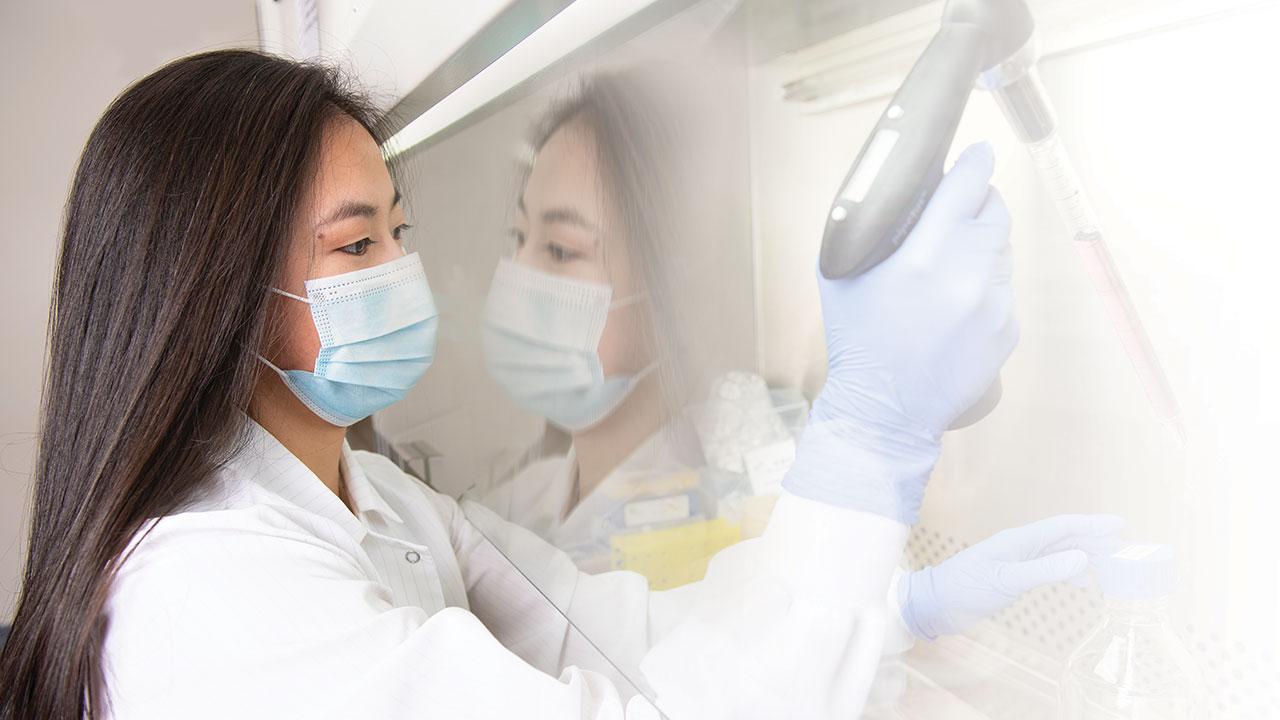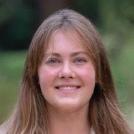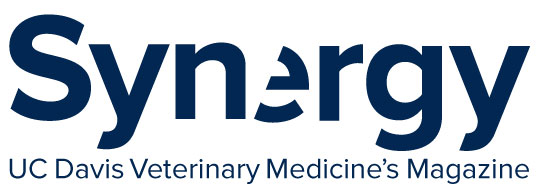
Training Future Leaders
Training Future Leaders
UC Davis prepares the next generation of veterinary researchers with help from prestigious grants such as the NIH Medical Scientist Training Program award and the NCI T-32 Comparative Oncology Training Program grant. This is the first year for UC Davis to receive both of these multi-year sources of funding.
Katie Griffin has always been drawn to helping others – of two- and four-legged species. But it was during her sophomore undergraduate year at UC Davis that she realized by combining research with her clinical interests in immunology that she could provide a bridge between animal and human medicine.
At the time, she was working as a veterinary technician in the Large Animal ICU at the veterinary hospital and with veterinary cardiologist Dr. Leigh Griffiths in his cardiovascular tissue engineering lab, collaborating with bioengineers on a xenogeneic scaffold development.
“I learned to work with stem cells and how to decellularize animal tissue to use as a biomaterial for regenerative medicine in humans,” said Griffin. “I really started to understand then how research could complement veterinary medicine and how veterinarians could lend a unique perspective to human medicine. That experience showed me I wanted to pursue immunology, but also have a reputation in the engineering field to build valuable collaborations.”
Griffin was in the right place to establish cross disciplinary connections. As she prepared for veterinary school, she began applying for the school’s highly competitive Veterinary Scientist in Training Program (VSTP). This program enables DVM students to pursue a PhD concurrently, providing them with a dual degree and training them as the next generation of veterinary researchers.
Griffin was admitted into the program where she is now in her second year of immunology doctoral studies, working under the mentorship of Dr. Kent Leach. She is currently focused on creating a novel in vitro system to study canine osteosarcoma, working closely with Dr. Bill Culp from the UC Davis veterinary hospital and clinicians at UC Davis Health.
UC Davis Receives NIH Grant to Expand Recruitment of Future Scientists
The VSTP got a huge boost this past fall for its 20th anniversary when it received the prestigious National Institutes of Health Medical Scientist Training Program (MSTP) award. This was the first time that the NIH has granted the award to colleges or schools of veterinary medicine as the lead institution to support students in a dual degree DVM-PhD program. UC Davis was one of only three veterinary schools selected.
“This is an important moment as it shows that veterinary medicine is receiving recognition as a leader in health overall, not just animal health," said Dean Michael Lairmore. “We are proud to be one of the institutions to steward these grants and we're excited to see the future achievements of the student grant recipients.”
Dr. Xinbin Chen, director of the VSTP, said this NIH award allows UC Davis to expand its VSTP training, including for five new recruits this academic year – one of whom is Griffin. The funds will provide nearly $250,000 annually during the five-year award period.
“Having this additional source of funding opens new opportunities to expand recruitment,” Chen said. “For the past two decades, our program has generated a number of veterinary scientists who are now leaders in academia, government and industry. This award is a wonderful recognition of that success and helps us to continue mentoring leaders of the future.”
At UC Davis, VSTP students complete their first two years of DVM education, then step into their PhD training, where they are guided by a faculty mentor during their dissertation research. Students in their first part of DVM training are advised by the VSTP Mentoring Committee on selecting a faculty mentor, research opportunities, and how to prepare for a variety of career paths.
“The financial relief of having this support is an amazing privilege,” Griffin said. “It’s such an honor to be included not only in the VSTP program, but also chosen as one of the first MSTP students. This connection with the NIH early on in my career will be a great help in achieving my long-term goals of joining veterinary academia as a large animal surgeon with a research lab that combines tissue engineering with immunology.”
Supporting the Next Generation of Comparative Oncologists
UC Davis is also taking a major leap forward in training the next generation of scientists engaged in basic and translational cancer research for animals and humans, thanks to a prestigious NIH T32 grant.
The grant, formally known as the Ruth L. Kirschstein National Research Service Award, supports institutions to develop or enhance research training opportunities for pre- and postdoctoral fellows to be trained in cancer research. UC Davis has been awarded approximately $1.9M over five years for the UC Davis Comparative Oncology T32 program, which is comprised of members from the School of Veterinary Medicine, School of Medicine, and the Comprehensive Cancer Center.
“This is the first time that the UC Davis Schools of Veterinary Medicine and Medicine have been awarded this level of support for an innovative Comparative Oncology Training Program,” said Dr. Michael Kent, a veterinary oncologist who serves as a co-principal investigator (PI) of the program. “It signals that the NIH recognizes the importance of One Health and that we can learn a lot about cancer by studying animals with cancer.”
Kent will be serving as co-PI along with Dr. Robert Canter, a surgical oncologist from UC Davis Health, and Chen, who is also a professor of surgical and radiological sciences in the veterinary school.
“Tackling complex cancer research problems should include investigators with broad experience across animal and human species, presenting a unique opportunity for DVMs and MDs to have a crucial role in basic and translational research,” Canter said. “Veterinarians can strengthen comparative approaches essential to multidisciplinary research accelerating innovative treatments for animals and humans, while medical doctors bring a patient-centered approach linking biology with clinical therapy.”
There are five individuals who will be supported by this funding over a five-year period: Savannah Tobin, a DVM/PhD student; Dr. Lauren Perry, a surgical resident at UC Davis Health; and three DVM graduates that have yet to be recruited. Twenty-seven faculty members from five academic departments will provide training and mentoring to those appointed to the program to complete their proposed projects.
Comparative oncology is one of five programs within the UC Davis Comprehensive Cancer Center. There are 51 such centers around the country that receive National Cancer Institute designation and funding. The UC Davis center received its comprehensive status five years ago and is the only one in the United States to have a formal program dedicated to comparative oncology.
“This is team science at its best,” Kent said. “With this NIH grant, we will be at the forefront of training the next generation of clinicians to do research in comparative oncology.”
MEET SAVANNAH TOBIN

As a VSTP student in her first year of DVM training, Savannah Tobin will receive support from the Comparative Oncology Training Program funded by the NIH T32 grant. Her first forays into research began in high school with two studies involving cats: one used GPS tracking to determine the territory of her outdoor cat, the other used PCR assays to quantify allergenic proteins in the saliva from various breeds. (Her mom was allergic to cats and she wanted to find if there was a breed less likely to trigger those allergies.)
Tobin plans to work in the Leach Lab this summer in her first ventures into bioengineering. Her project is to culture triple negative breast cancer cells in a 3D fibrin-alginate interpenetrating network hydrogel, a biomaterial whose mechanical properties are easily modulated for experiments. She’ll look at how stiffness of the matrix affects breast cancer cell survival and possibly acquired chemotherapy resistance. While Tobin said her career plans are continuing to develop, she intends to pursue an academic track of studying naturally-occurring cancers in animals and humans. “It’s definitely an honor to receive this funding and I’m so grateful for how it will support the pursuit of those dreams.”
MEDICAL SCIENTIST TRAINING PROGRAM AWARD RECIPIENTS

Elizabeth Ashley, first year DVM student
Background: MS in Marine Biology from the University of Georgia
Research Interests: Wildlife epidemiology, disease ecology, One Health
Career Goals: Inform decision-making for wildlife conservation and public health

Olivia Cords, second year DVM student
Background: BA in Human Biology from Stanford
Research Interests: Epidemiology, infectious disease, One Health
Career Goals: Epidemic Intelligence Service/Academia

Katie Griffin, second year PhD student
Background: BS in Microbiology and a minor in Economics from UC Davis
Research Interests: Immunology and bone tissue engineering
Career Goals: Academia (large animal surgery clinician scientist)

Daniela Jimenez, first year DVM student
Background: BA in Biology from Washington University in St. Louis, MO
Research Interests: Neuro-immunology, Gut Brain Axis
Career Goals: Academia, clinician-scientist

Aryana Razmara, second year DVM student
Background: BS in Biological Sciences from UC Davis
and MS in Animal Science from Stanford
Research Interests: Oncology
Career Goals: Residency; clinical and research balance; advocate for diversity in vet med/academia and animal welfare policy
